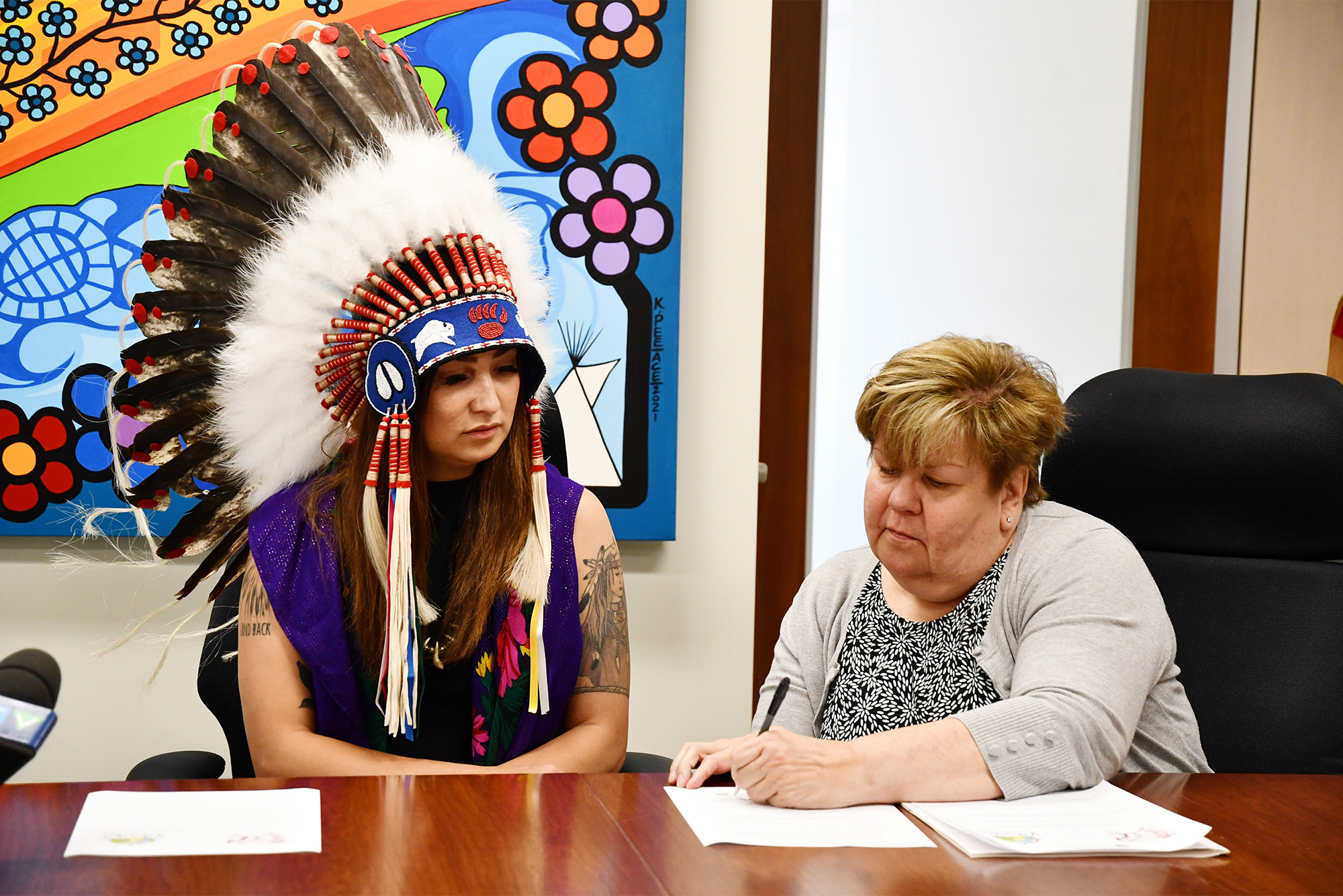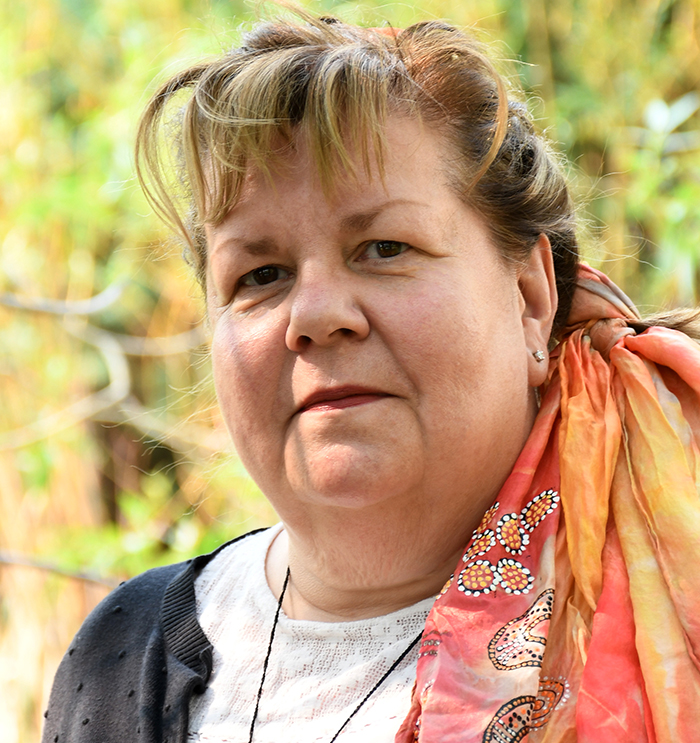Bringing Indigenous health into the light: Supporting Indigenous women’s wholistic healing journey

Like many natural-born helpers, Dr. Alexandra King always dreamed of being a doctor when she was growing up. But her path to medicine was not exactly straight-forward.
“I used to work in management of web-based software development – which, on the surface, is very different from medicine,” she recalls. “But the two fields are actually quite similar: they’re about identifying when a problem exists and then trying to find the best solution to address that problem. I loved working in such a challenging environment, but it was a state of impermanence. I knew that whatever I was working on would eventually be replaced by something newer. Over time, I realized I wanted to put my energy, passion and love into something that had more of a lasting impact.”
It was when Dr. King was in her late twenties that she shifted her focus toward a career in medicine and research, which opened up many new avenues. As a First Nation physician, researcher, and the inaugural Cameco Chair in Indigenous Health and Wellness at the University of Saskatchewan, Dr. King now works in partnership with Indigenous organizations, physicians, communities, and Elders across Saskatchewan to better understand and support the health needs of First Nations and Métis peoples.
“We know that First Nations, Inuit and Métis peoples tend to face poorer health outcomes than non-Indigenous populations, but it’s important to remember that our health extends beyond just our individual biology and genetics,” she explains. “Health is wholistic. Things like culture, history, education, socioeconomic status, lived experiences – these are all factors that impact our health, too. For many Indigenous people, these impacts can be significant and, unfortunately, our current systems often make those impacts significantly negative. But it doesn’t have to be this way. We can – and I would say that we must – build new programs and structures to promote healing.”
Addressing structural determinants of health

Dr. King’s research focuses on addressing the social and structural (systemic) impacts that affect Indigenous peoples’ health. She and her team at Pewaseskwan (the Indigenous Wellness Research Group) are currently creating a healing program called Apihkatatan, which means “Weaving Our Baskets.” The goal of the program is to support the wholistic healing and wellness journeys of Indigenous women in Saskatchewan who have been involved with the criminal justice system.
The need for the Apihkatatan program stems partly from the overrepresentation of Indigenous women in the criminal justice system. Across Canada, Indigenous women currently account for about 48% of the population in women’s federal prisons, even though only 5% of the population in Canada identifies as Indigenous. This is what experts call a structural determinant of health. While social determinants of health include individual factors like gender, culture, education and income, structural determinants are much more complex. They tend to look at the larger structures and systems that are in place in our society, and how they affect the health of not just one individual, but an entire community or population of people throughout their lifetime.
“There is no one single reason why Indigenous women make up such a large portion of the population in Canadian prisons; rather, there several different, intersectional factors at play here,” Dr. King continues. “These women may be survivors of residential schools, or the children of survivors who may carry intergenerational trauma and face mental health challenges or addiction as a result of that trauma. We also know that Indigenous women are more likely than non-Indigenous women to live in poverty, face higher levels of surveillance from police, and be victims of crimes based in racism and gender-based violence.”
Together, these factors create a system in which Indigenous women are inequitably disadvantaged from the start. This, in turn, contributes not only to the disproportionately high number of Indigenous women in Canada’s criminal justice system, but also to the health inequities that Indigenous women face.
Wholistic healing through connection with land and culture
In response to these inequities, Dr. King’s research is helping Indigenous women heal in a wholistic way through the Apihkatatan project.
“When Indigenous women leave the criminal justice system, they carry their experiences and trauma with them,” she says. “They may still face challenges – mentally, physically, emotionally, and spiritually – that require healing.”
To develop the curriculum and therapeutic programming for Apihkatatan, Dr. King is taking a community-based, Two-eyed Seeing approach to her research and working directly with women who have been involved in the criminal justice system to understand their unique health and healing needs. Two-eyed Seeing is particularly important in this work as it recognizes the strengths of both Indigenous ways of knowing and Western approaches, resulting in collaborative, cross-cultural and culturally responsive research.
“In our previous research, we learned that connection with land and culture is vital for Indigenous women to begin and sustain their healing journey,” she says. Traditionally, Indigenous peoples have a profound spiritual, physical, social and cultural connection with the land, and their relationship and interconnection with the land are deeply engrained in their culture.
“Our culture and our land give us a sense of belonging – a sense of who we are,” Dr. King says. “When we lose this connection, we risk losing that sense of belonging, which can have negative impacts on our mental, emotional and spiritual health. So, we know that the therapy and programming we offer through Apihkatatan must be land- and culture-based to help Indigenous women connect or reconnect with their culture and find that sense of belonging again.”
Slow and steady
Dr. King’s focus on community-based research is inherently different than research that is done in a laboratory or controlled environment because it has direct and often immediate impacts on community members. With this comes important considerations for conducting that research, Dr. King stresses.
“When my team and I conduct our research interviews, sharing circles or surveys, we need to be very careful and thoughtful about how we are doing it and whether we are doing it in a culturally appropriate and ethical way,” she explains. “The intention of our work is to support Indigenous women in their healing journey – and we don’t want to compromise that by creating unsafe or unsupportive spaces.”
Consider, for example, personal interviews. The women who volunteer to participate in a research study may have experienced incarceration, chronic health conditions, homelessness, addiction, or trauma. This is important to keep in mind because the questions or conversations that come up during the interview could be sensitive or triggering for the participant, and researchers have an ethical duty to minimize any additional pain or harm for those individuals.
That is why Dr. King believes it’s important to take a slow and steady approach to her work. Slowly and thoughtfully building connections with the women she works with helps to create deeper and more trusting relationships, which enables Dr. King and her team to support them more effectively.
“I’ve had the pleasure of working with a variety of Elders and Knowledge Holders through my work, and one piece of advice I’ll never forget was from an Elder here in Saskatchewan who said to me, ‘When you take somebody into darkness, you need to leave them with some light,’” Dr. King says. “What she meant by that is after you’ve completed a research interview and asked someone all sorts of difficult questions about difficult topics, you need to give them space to process what they’ve said and leave them feeling positive about the interaction. You need to help bring them back into the light.”
While Dr. King and her team are helping bring the women they work with back into the light, they are also helping bring them back to their culture.
“Indigenous culture is beautiful, grounding, and profoundly healing,” she says. “I’m honoured to work with such strong Indigenous women and witness them throughout their healing journey as they connect, reconnect and celebrate their culture. I’m also inspired by the positive impacts our research can have on First Nations and Métis people in Saskatchewan, because we aim to help our participants achieve a better place physically, emotionally and spiritually. We are proving that there are better ways to move forward.”
- Date modified: